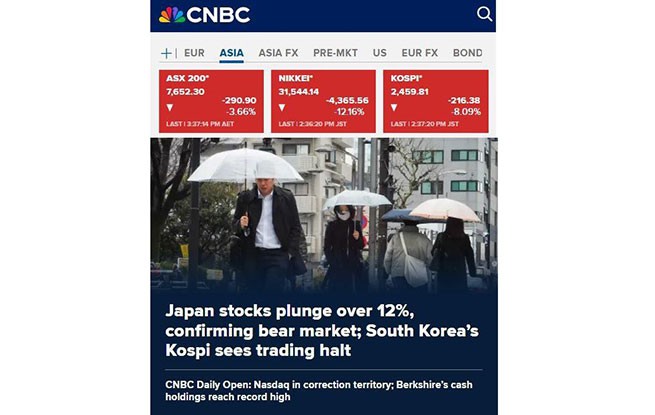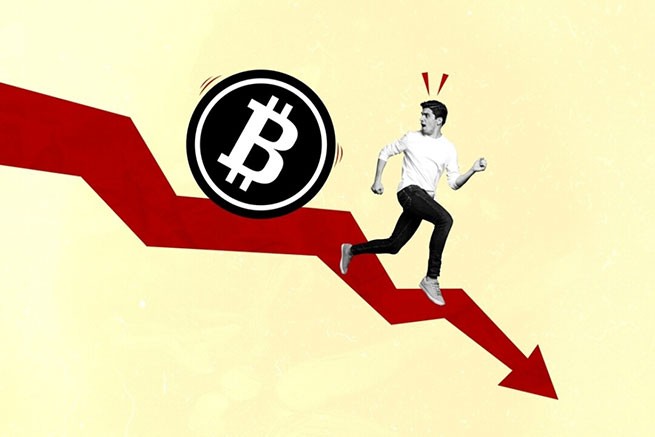On Monday, August 5, several asset classes unexpectedly fell. Thus, Bitcoin fell to January levels in a few hours.
The international financial community is in great alarm as the stock markets of Japan and South Korea are currently collapsing. Along with stocks, the cryptocurrency market has plummeted.
At the same time, oil prices fell to early 2024 levels, and stock prices in Japan, South Korea, Turkey and Russia also fell sharply. What's going on? Could this be the beginning of global economic troubles?
The international financial community is in great alarm as the stock markets of Japan and South Korea are currently collapsing. Along with stocks, the cryptocurrency market has plummeted.

In a slide that also spread to other Asian markets, Japan's Topix index fell 11%, erasing its gains for the year. The Nikkei 225, which on Friday suffered its biggest one-day drop since the 1987 crash, fell more than 4,600 points. Trading in Topix and Nikkei futures was halted as the panic sell-off continued into the afternoon, hitting “circuit breakers” that automatically halt trading. Korea's circuit breakers were triggered for the first time in four years.
Futures markets were pointing to Japan's sell-off likely to spread to Europe and the United States, with investors bracing for renewed volatility amid concerns that the Fed has been slow to act on signs of a cooling U.S. economy and may now be forced to cut rates.
Traders in Tokyo said the selloff was part of a broader correction and hedge fund positioning aimed at reducing risk. But Tokyo shares were also weighed down by the yen, which has strengthened about 9% since mid-July.
“Japanese [биржевой индекс] Nikkei suffers biggest crash since Black Monday in 1987,” the world’s largest news outlets reported on Monday, August 5. editions. So in just one day of trading, the largest Japanese companies (such as Sumitomo, Mitsubishi, Marubeni) lost at almost 15% of its value.
However, this was only the beginning – following the Tokyo Stock Exchange, problems also began on other trading platforms around the world. The Hong Kong Stock Exchange Index fell by almost 1.5%; Istanbul Stock Exchange suspended trades after the index collapsed by almost 7%; the same decision was made accepted management of the South Korean stock exchange after the index collapsed by almost 9% in one morning. Against this backdrop, the Moscow Exchange also opened lower by 3%. A later drop in quotes was also recorded on the American stock exchange, Apple shares sank by almost 8%.
On the morning of August 5, the price of not only many stocks fell. For example, the price of Brent oil fell below $76 per barrel, a price the market has not seen since January 2024. The cryptocurrency market also saw a sharp decline – Bitcoin in just a few hours lost 18% of its value, returning to the $50,000 mark. This, again, hasn't happened since the beginning of 2024..
What's the matter? How? writes Reuters, the reason for the sharp collapse of the stock market was “gloomy data on the U.S. labor market,” which may indicate the danger of a recession, that is, a slowdown in economic growth, which could affect the entire world economy. “Signs of growing weakness in the U.S. economy are clear: negative indicators for hiring, retail sales and the business activity index,” — leads Reuters quotes Bruno Schneller, managing partner of Erlen Capital Management.
“The main reason for the decline on global stock exchanges is related to fears of the US economy going into recession,” Alexander Bakhtin, investment strategist at BCS World of Investments, told Sobaka.ru. “The US regulator gave the signal to lower interest rates next month, while the latest macroeconomic data, in particular the July report on the labor market, turned out to be noticeably weaker than forecast. Almost simultaneously, the Bank of Japan unexpectedly raised the key rate, which turned out to be a painful decision for the local stock market, especially for Japanese exporters. The Nikkei index, which experienced its biggest decline since 1987, dragged most of the Asia-Pacific region stock exchanges down with it.”
The collapse of the stock market could not have gone unnoticed by trading in other assets, notes Evgeny Kogan, professor at the National Research University Higher School of Economics, investment banker and founder of the project, in a commentary for Sobaka.ru Bitkogan“Why are we seeing a synchronous fall in cryptocurrency, stock markets, and the commodities market (goods usually sold on the stock exchange, such as oil, metals, etc. – editor's note)? The fact is that global markets are very closely interconnected. In particular, people who lose on the stock market, they also sell gold and the same crypto. The nervousness of clients is transmitted everywhere and anywhere,” he explains.
Is this the beginning of a major crisis? “It is premature to talk about the risks of a global crisis, while we can still talk about a correction, albeit a fairly large-scale one,” believes Alexander Bakhtin of BCS World of Investments.
Investment banker Evgeny Kogan expressed a similar opinion in a conversation with Sobaka.ru. “Whether this is the beginning of a major crisis phenomenon or not, we will find out only in about three months, not earlier. No one can ever say at the moment of the first movement whether this is the beginning of something big or just a correction,” he says.
However, Kogan adds, “the American economy (and the global economy as a whole) is quite strong.” “Yes, there is a slowdown, and central banks, as usual, are lagging behind [с реакцией на события в экономике]yes, there are problems. Will this lead to a global world crisis? More likely no than yes, but it is quite possible that this will lead to further sell-offs in the stock market. I think the markets will jump, hysteria, and then correct upwards.”
Although there are also more gloomy forecasts. Thus, financial analyst of the Golden Monetary House Dmitry Golubovsky in an interview with the publication Business Online assumedthat what is happening could be a symptom of an impending “global recession.”

In a slide that also spread to other Asian markets, Japan's Topix index fell 11%, erasing its gains for the year. The Nikkei 225, which on Friday suffered its biggest one-day drop since the 1987 crash, fell more than 4,600 points. Trading in Topix and Nikkei futures was halted as the panic sell-off continued into the afternoon, hitting “circuit breakers” that automatically halt trading. Korea's circuit breakers were triggered for the first time in four years.
Futures markets were pointing to Japan's sell-off likely to spread to Europe and the United States, with investors bracing for renewed volatility amid concerns that the Fed has been slow to act on signs of a cooling U.S. economy and may now be forced to cut rates.
Traders in Tokyo said the selloff was part of a broader correction and hedge fund positioning aimed at reducing risk. But Tokyo shares were also weighed down by the yen, which has strengthened about 9% since mid-July.







More Stories
140 new 'green' buses are running in Athens
Medicines: rising costs for citizens
BRICS and G7: New Energy Race and Struggle for Resources